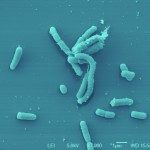Link to Pubmed [PMID] – 19295651
Link to DOI – 10.1139/w08-114
Can J Microbiol 2009 Feb; 55(2): 189-96
The contribution of growth history and flagella to adhesion of Listeria monocytogenes was analysed. An in-frame deletion on the flagellin encoding gene (flaA) was performed in L. monocytogenes EGD-e to compare its adhesion ability with the parental strain, after cultivation at various pH values and temperatures. The pH, as well as the temperature, affected the adhesion of L. monocytogenes EGD-e. In addition, the adhesion of L. monocytogenes EGD-e was reduced in energy-depressed cells. Conversely, the physicochemical bacterial surface characteristics affected by growth history did not influence the adhesion. Adhesion variations observed among environmental and clinical strains was attributed to the flagella. The naturally aflagellated strains resulted in an adhesion capacity similar to that observed for mutants and parental strains cultivated under flagellum expression repressing conditions. However, L. monocytogenes is able to adhere to inert surfaces through a residual adhesion process without flagella. All these observations emphasize the importance to consider the food environmental factors in the risk assessment of L. monocytogenes in food industry.



